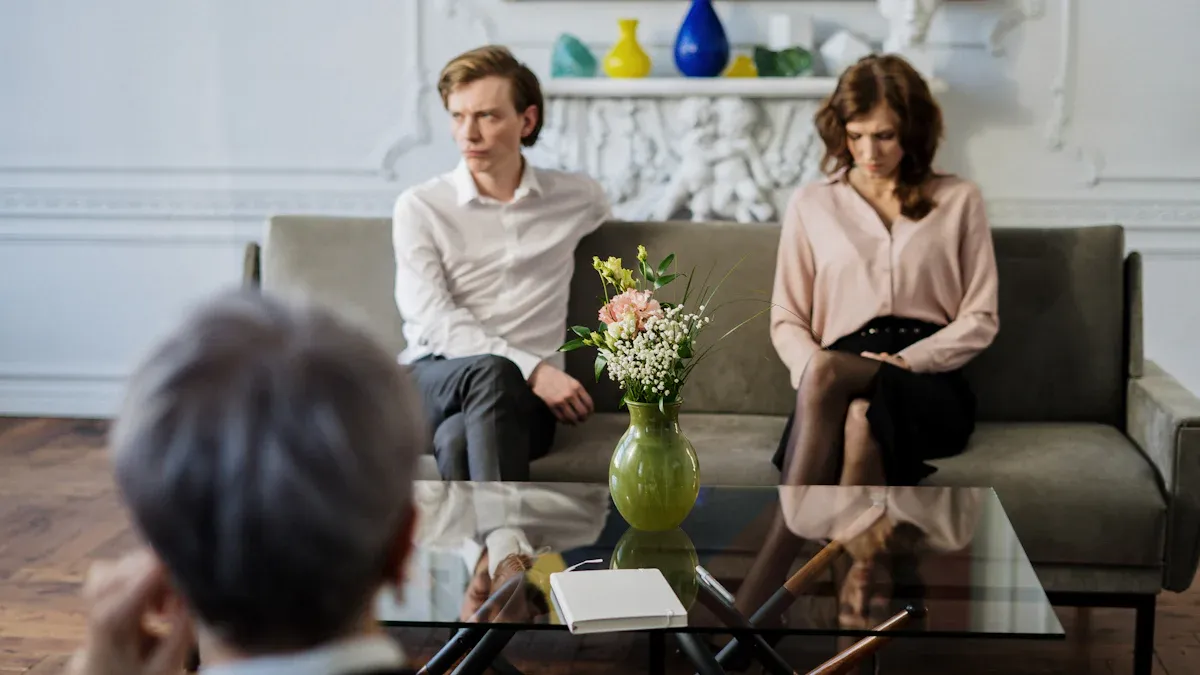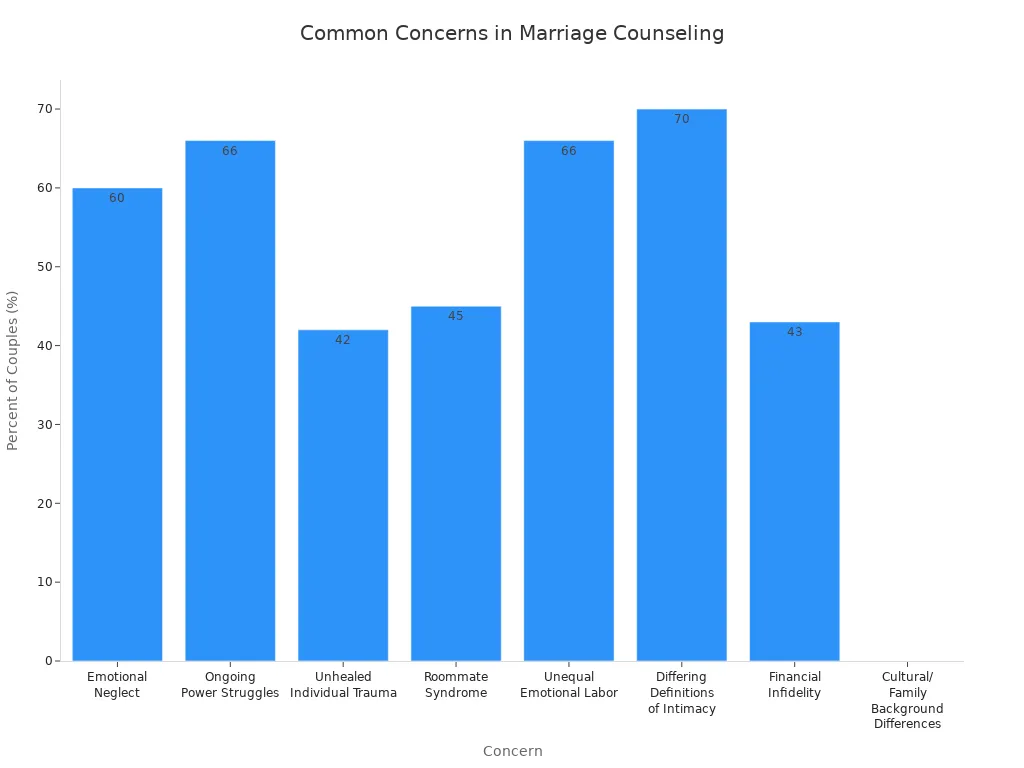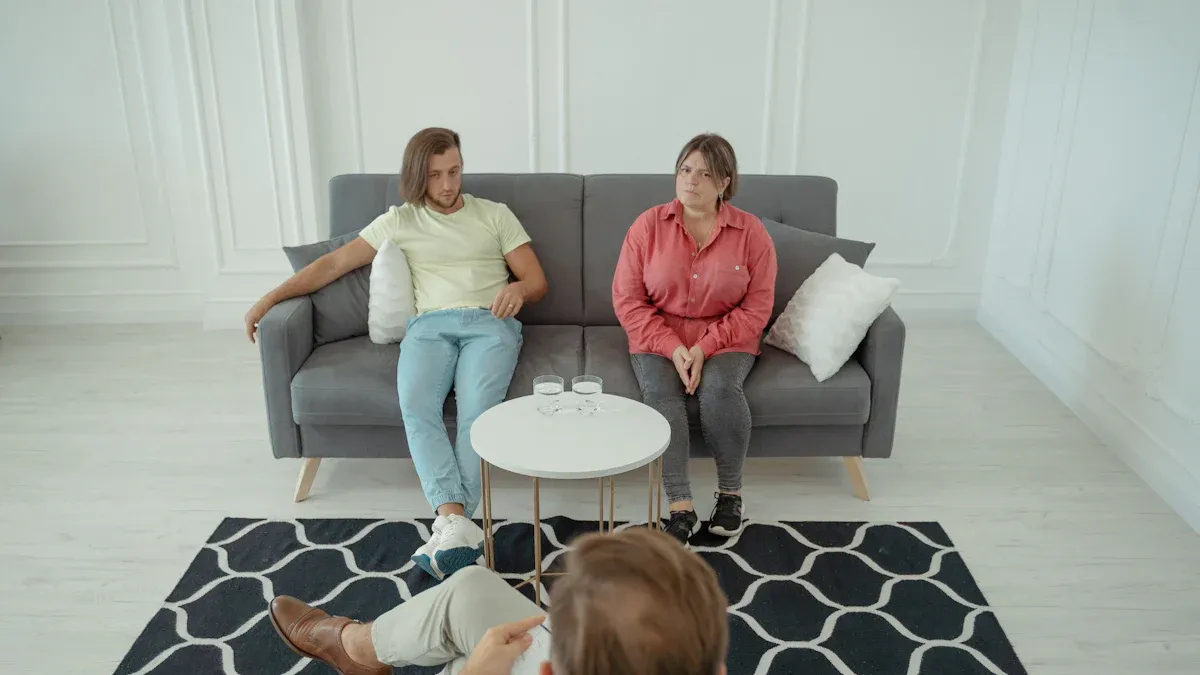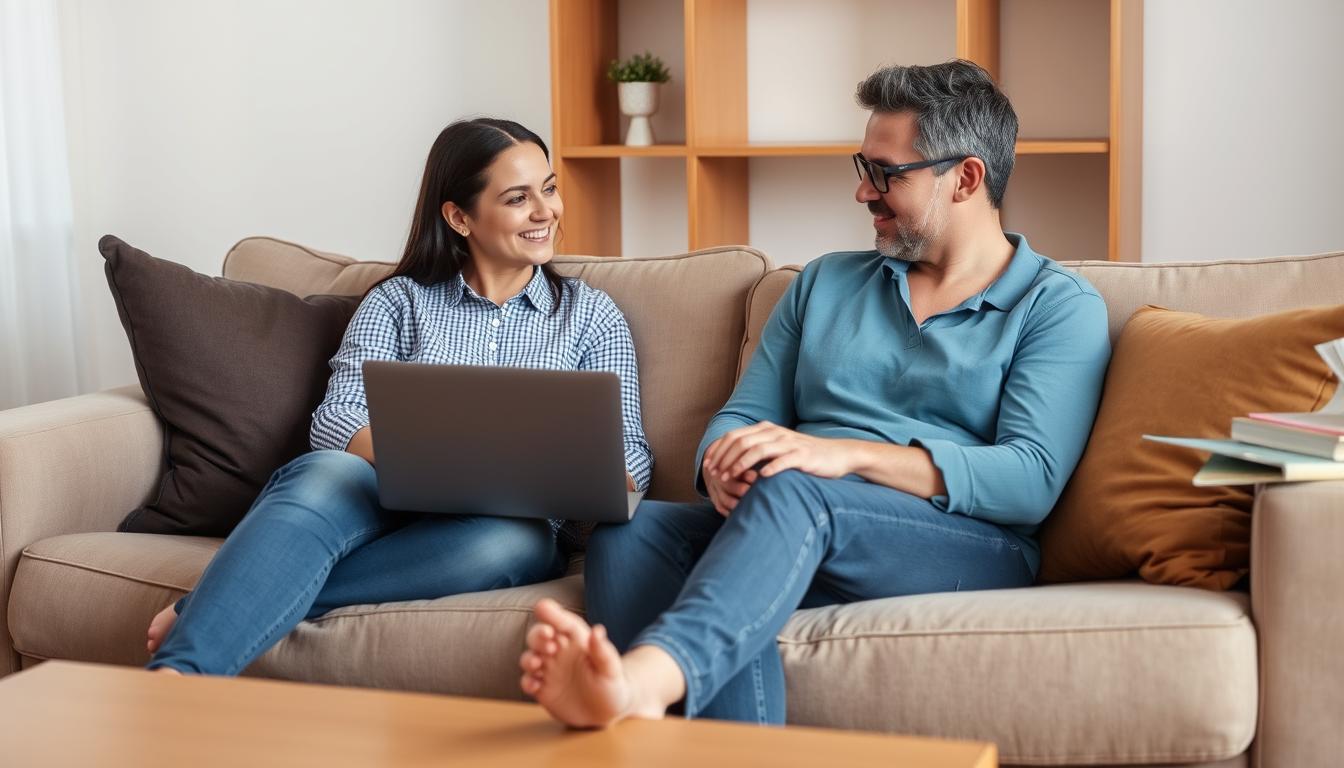You want real change in your relationship. Marriage counseling can help you get it. Studies show that about 70% to 75% of couples feel happier after seeing a counselor.
70% say they feel better about their relationship (Here & Now Mental Wellness)
75% notice their relationship gets stronger (My Denver Therapy)
72% feel happier together (LifeBulb)
Counseling helps you see and stop bad habits like blaming and being defensive. With the right help, you can trust each other again and feel closer. Think about how marriage counseling can help you and your partner have a happier future.
Key Takeaways
Marriage counseling helps couples talk better. It teaches them to listen and share feelings. They learn to do this without blaming each other. Counseling shows healthy ways to deal with fights. It helps couples solve problems instead of hurting each other. Couples can rebuild trust by talking openly and being honest. A skilled therapist helps them do this. Therapy helps couples feel closer and safer together. It makes their emotional bond stronger over time. Success in counseling needs early help. Both partners must want to work on things. Picking the right therapist is also important.
Marriage Counseling Benefits

Communication Skills
You want your partner to listen and understand you. Marriage counseling gives you ways to make this happen. Many couples have problems like interrupting or blaming each other. Some people stop talking when upset. A good therapist helps you stop these habits. You learn to say what you feel and listen with care.
Tip: Going to sessions often helps you practice new ways to talk. It gets easier to solve problems together.
Here is how marriage counseling helps you talk better, based on new studies:
Statistic / Finding | Description |
|---|---|
70% to 80% | People in therapy do better than those who are not |
Nearly 99% | Couples say therapy helps their relationship |
12 sessions (average) | Most couples talk better after about 12 sessions |
Core benefits | You listen better, share feelings, and have fewer mix-ups |
After a few sessions, you and your partner start to understand each other more. You learn to share feelings without being scared. You also learn to listen without judging. These skills help make your relationship strong.
Conflict Resolution
All couples have fights sometimes. Happy couples handle fights in a good way. Marriage counseling teaches you to use fights to grow. You learn to control your feelings and not yell or walk away. You focus on fixing the problem, not hurting each other.
Therapists use things like active listening and problem-solving. You practice saying “I” instead of blaming. You take breaks when things get too heated. You work together to find answers. These skills help you fix small and big problems without hurting your relationship.
Note: Studies show couples who learn these skills in counseling stay together more and have stronger relationships.
Rebuilding Trust
Trust can break for many reasons. It could be cheating, secrets, or broken promises. Fixing trust is hard, but marriage counseling gives you a safe place to try. You and your partner can talk about your feelings. The therapist helps guide the talk.
Counseling helps you talk openly and show care.
You learn to take blame and be honest.
Over 60% of couples feel better after therapy, even after trust is broken.
Both people must want to heal for it to work.
Therapists use things like Emotionally Focused Therapy. This has a 70-75% success rate for couples after betrayal. You set rules, say what you need, and build trust again step by step.
Emotional Connection
A strong emotional bond makes your relationship feel safe. Marriage counseling helps you get close again. It gives you a calm place to talk. You learn to listen without getting mad. You say what you need without being scared.
Therapy helps you see each other’s feelings and needs.
You practice caring and showing you understand.
Methods like the Gottman Method and Emotionally Focused Therapy help you build friendship and closeness.
Studies show couples in counseling feel happier and closer.
You will feel less stress and more love in your relationship. Over time, these changes help you and your partner feel happier and more connected.
Remember: Almost 90% of couples who finish therapy feel safer and more comfortable with each other.
Lasting Change

How Change Happens
You want real change that lasts, not just a quick fix. Marriage counseling helps you reach this goal by guiding you to look deeper at yourself and your relationship. You learn to spot old patterns, like reacting out of anger or shutting down when things get tough. When you work on these habits, you start to act with more understanding and care.
Lasting change happens in two steps. First, you see fast progress as you learn new ways to talk and connect. Next, you keep growing by practicing these skills every day. You and your partner build trust and intimacy by sharing your true feelings and needs. Honest self-examination plays a big part. When you look at your own actions and feelings, you take responsibility and grow stronger together.
When you both commit to this process, you move from old, hurtful habits to new, healthy ways of being together.
Safe Space
Marriage counseling gives you a safe place to talk. You can share your thoughts and feelings without fear of being judged. The therapist makes sure both of you feel heard and respected. This safe space lets you open up about things you might hide at home.
You can talk about hard topics, like feeling unappreciated or hurt.
The therapist helps keep the talk fair and calm.
You learn to listen and show empathy, even when you disagree.
This safe environment helps you lower your guard. You become more honest and willing to work through tough issues. Over time, you build trust and learn to solve problems together.
Skill Building
You gain powerful tools in marriage counseling. These skills help you handle stress, talk about problems, and rebuild trust. Therapists use proven methods like Emotionally Focused Therapy and the Gottman Method. You practice active listening, manage your emotions, and learn to work as a team.
You learn to spot and stop negative patterns.
You practice new ways to talk and solve problems.
You get homework to use these skills at home.
These skills last long after therapy ends. Couples who keep using them see better results and feel happier together. You invest in your future by building habits that support a strong, loving relationship.
Success Factors
Timing Matters
Some people wait too long to get help. Most couples wait about six years before starting marriage counseling. By then, bad habits and hurt feelings are already there. Getting help early stops problems from getting worse. If you ask for help during big life changes, you can protect your relationship. You have a better chance to fix trust and talk better.
Tip: Start before things get really bad. It is easier to make changes when you begin early.
Motivation
How much you want to change affects your results. When both people want to work on things, you get better results. You need to come ready to listen and share. You also need to take responsibility for what you do. If you both try hard, you can build trust and grow together. Even if your problems seem big, trying your best helps a lot.
Be honest about your feelings.
Listen to feedback and think about it.
Work on your relationship outside of sessions.
Therapists see that couples who stay motivated get the best results.
Therapist Fit
Picking the right therapist is important. You need someone who knows how to help couples. Both people should feel safe and comfortable. A good therapist uses proven ways to help and stays fair. Look for someone with special training, like a Licensed Marriage and Family Therapist or someone trained in the Gottman Method or Emotionally Focused Therapy.
Note: Most couples say their experience is good or great when they trust their therapist and feel listened to.
Participation
You get more from marriage counseling when you both join in. Being active means showing up and doing the work. You also need to practice new skills at home.
Do homework together.
Practice listening and sharing honestly.
Couples who work hard often see good changes in a few weeks. Your effort helps you trust each other, feel closer, and make lasting change.
Common Concerns
Does It Work for Everyone?
You might wonder if marriage counseling helps all couples. About 70% of couples see real changes, but 30% do not. Some couples do not talk openly or do not try hard. Others wait too long before getting help. Cost and finding a good therapist can be hard. If your therapist is not trained, they might make mistakes. This can slow down your progress. You need a counselor who listens and helps you both.

Many couples have problems like feeling distant or fighting for control. Some feel more like friends than partners. Therapy helps you find these problems and fix them. If you both join in and stay open, your relationship can grow stronger.
Online vs. In-Person
You may wonder if online counseling works as well as in-person. Studies show both ways help couples the same amount. After 12 weeks, both groups feel better. Online sessions are easier and more private. Most people like virtual therapy, and the good effects last. If you have big problems like abuse or lots of fighting, in-person is safer.
Individual or Joint Sessions
You might think about going alone or together. Research shows joint sessions work better for most couples. When you both go, you solve problems faster and save money. Over 98% of couples say joint therapy gives better tools. If you go alone, the therapist may miss important things. Working as a team helps you both heal and grow.
Overcoming Doubts
It is normal to feel unsure about starting counseling. You can beat doubts by learning what to expect and making goals together. A good therapist will build trust and explain how things work. You should come ready to talk and share your hopes. Remember, change takes time. Focus on small steps and celebrate each win.
Obstacle | How to Overcome It |
|---|---|
Know that change is slow and steady | |
Denying Your Role | Work together and share the work |
Keeping Secrets | Be honest to build trust and move forward |
You can make counseling work for you. Stay open, work together, and trust the process. Your relationship can get even stronger.
You can make real changes in your relationship with marriage counseling. Studies show therapy helps most couples feel less upset and get closer. Pick a good therapist early, keep trying, and be honest when you talk.
Tell each other your feelings and listen without blaming.
Make clear goals together and respect each other’s limits.
Start today. A better, happier relationship begins with one choice.
FAQ
How long does marriage counseling take?
Most couples see results in 8 to 12 sessions. You may notice changes sooner if you practice new skills at home. Your progress depends on your effort and your goals.
What if my partner does not want to go?
You can start alone. Share your reasons and invite your partner to join. Many people feel more comfortable after the first session. Your willingness can inspire change.
Is marriage counseling confidential?
Yes, your sessions stay private. Therapists follow strict rules to protect your information. You can speak openly and trust your counselor to keep your details safe.
Can counseling save every marriage?
Counseling helps most couples improve. You both need to try and stay open. Some relationships may not work out, but you will gain tools for better communication and self-understanding.



Pingback: Couples Therapy: Improve Your Love Life
Pingback: Top 10 Relationship Challenges Every Boyfriend Faces and How to Overcome Them